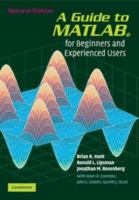Differential Equations with MATLAB
"Differential Equations with MATLAB" (2nd ed.) by B. Hunt, R. Lipsman, J.Osborn and J.Rosenberg is a supplemental text that can enrich and enhance any first course in ordinary differential equations. Designed to accompany Wiley's ODE texts written by Boyce/DiPrima, Borrelli/Coleman and Lomen/Lovelock, this supplement helps instructors move towards an earlier use of numerical and geometric methods, place a greater emphasis on systems (including nonlinear ones), and increase discussions of both the benefits and possible pitfalls in numerical solution of ODEs. By providing an introduction to the software that is integrated with the relevant mathematics, "Differential Equations with MATLAB" can perfectly complement and enhance these texts.
Format:Paperback
Language:English
ISBN:0471718122
ISBN13:9780471718123
Release Date:January 2005
Publisher:Wiley
Length:320 Pages
Weight:1.50 lbs.
Dimensions:0.7" x 7.4" x 9.2"
You Might Also Enjoy
More by Ronald L. Lipsman
Customer Reviews
0 customer rating | 0 review
Rated 5 starsgood book for scientist and engineer
By Thriftbooks.com User,
just read this book, and found it is a very good book. it does not cotain many mathematical aspects of differential equations. but it is a very good introduction about how to solve it in matlab.
0Report

















































